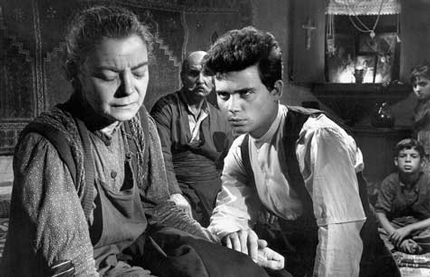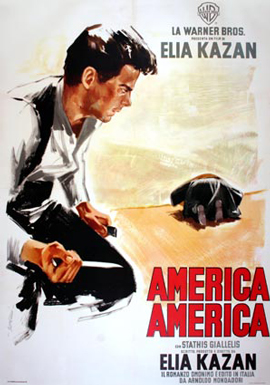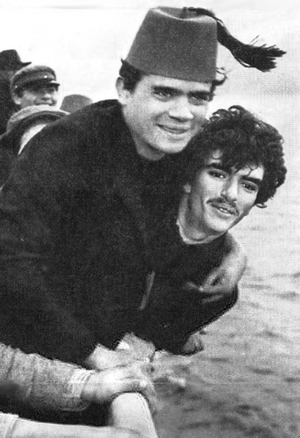
 |
|
|
|
"Wild River and America America came closest to my theory of the humble and the poetic, the unnoticed poetry that's all around us." -- Elia Kazan Elia Kazan signed a long list of superior movies, but his masterpiece as a writer-director is America America, a fascinating and wholly naturalistic account of the escape from Turkish oppression by Kazan's Uncle Joe at the beginning of the 20th century. Unlike some late-career works by other directing giants, one needn't watchAmerica America out of a sense of duty -- it's absorbing, entertaining and enlightening. Forget Francis Coppola's immigration sequence in The Godfather; America America is three times more potent. Kazan's associates loved his screenplay but advised him to drop a scene in which a grateful new American, alighting from a boat, drops to his knees to kiss the ground of his new country. What could be more corny? Kazan knew better. Immigrants coming off the boat did exactly that, overcome by emotion and gratitude. 
Warner Bros. took over America America's production funding when producer Ray Stark backed out at the last minute, after Kazan and company were already in Greece and filming. Kazan filmed only four days in Istanbul, where Turkish censors bugged his hotel room and forbade him to shoot anything but palaces and Mosques. Most of the filming was accomplished in Greece, and Kazan brought only a handful of actors from New York. Local actors and unknowns filled a number of key roles, including the all-important lead. Kazan turned his superior directing skills to helping the non-pros portray fully fleshed characters. ElIa Kazan's film began as a short story that was then expanded into a novel. Most of the events actually happened to Kazan's uncle. Just before the turn of the 20th century, the Turkish persecution of its ethnic Armenian population takes a big upswing. Young Greek Stavros Topouzoglou (Stathis Giallelis) witnesses the massacre of some Armenians in a church, including his friend Vartan (Frank Wolff). Fearing that the Turkish army will also attack the minority Greek population, Stavros' family loads a donkey with all of their valuables and sends the boy to a relative in Constantinople. The idea is that Stavros will go into business with the rug seller, and earn enough money to bring the rest of the family to the safety of the big city. But Stavros has a bigger dream: to reach the fabled shores of America. Thus begins an odyssey of pain and discovery, as Stavros is robbed on the road, humiliated in the city and robbed again when he tries to earn money working as a dock laborer. He focuses all his energy on gaining the $110 dollars needed for passage to America, where his "sins will be washed clean." Stavros' only friend is an anarchist named Garabet (John Marley), who lectures that one cannot amass money by working, only by stealing it or marrying it. Stavros offers himself as a prospective husband for the daughter of a prosperous rug trader, with the intention of betraying both of them as soon as he has the passage money. He's troubled to learn that his bride-to-be is a decent girl undeserving of the pain he will bring her. But nothing will to keep Stavros from boarding the big ship to New York City, even if he lacks the paperwork to clear the immigration authorities. Although it mostly takes place in a foreign country, ElIa Kazan's America America is a great American epic, an odyssey that becomes a tribute to the human spirit. Stavros' loving family is so desperate that they entrust all their worldly possessions to a boy who can't be relied upon to run a simple errand. Stavros predictably becomes easy prey for a Turkish thief (Lou Antonio), who ingratiates his way into a friendship and then takes everything Stavros has. In the capitol Stavros must labor like an animal and humiliate himself to save pennies. When his fellow laborers ask why he's such a shameless toady, Stavros replies, "I keep my honor safe inside me." It's an unforgettable portrait of the idealistic poor: although Stavros is in a near-hopeless situation, he writes his family assuring them that everything will be okay. 
When Stavros decides to swindle the rug dealer he becomes a handsome young man in a dark suit and fez, quietly negotiating the marriage while trying to avoid hurting the sweet Thomna (Linda Marsh), who only fears that she won't be a good wife for him. Stavros steps into an even darker moral dilemma when becomes a gigolo for an unhappy Turkish-American woman (Katherine Balfour). That gets him onto the New York ship, but not into a group of eight "legal" orphans being taken to America to toil as shoeshine boys. The husband of Starvros' lover is on to his wife's game, and is determined to see the boy's hopes dashed. How will Stavros avoid being sent back to Turkey? Kazan shows the reality of the coming Armenian holocaust in no uncertain terms. Stavros learns the hard way that to survive he must be ruthless and look out only for himself. The serious Vartan identifies strongly with his Armenian heritage, and is wiped out. The church offers Vartan's people little or no protection. The radical Garabet joins a revolutionary movement that is easily crushed by the Turkish authorities. Stavros eventually spills his soul to Thomna but also makes her understand that he's been humiliated, cheated, robbed, beaten and shot, and nothing will stop him from taking that boat to a new life. There's a difference between being a criminal, and simply doing what must be done to survive. No other movie communicates the immigrant experience as honestly - standard immigration stories usually portray Ellis Island arrivals as happy peasants in clean ethnic costumes. Many aspiring Americans had to claw their way here, just as immigrants do now. By using mostly unfamiliar faces, Kazan invests the film with an exciting unpredictability. Elena Karam and Harry Davis are Stavros' parents, and Estelle Hemsley his outspoken grandmother. Paul Mann is a standout as the prospective father-in-law, an enormous man complaining that his wife feeds him too much, while he and his brothers must unbutton their trousers after every meal. Katharine Balfour's desperate housewife foolishly thinks she's hiding her dalliance with Stavros from her pompous husband Robert H. Harris. Gregory Rozakis is heartbreaking as Stavros' closest friend, a good soul simply too weak to endure the voyage to the New World. Kazan's creative collaborators, like production designer Gene Callahan, soon became top names in their specialties. Cameraman Haskell Wexler began working in experimental documentaries like The Savage Eye. He gives the film a semi-docu look completely unlike any Hollywood filmmaking style of the time. Dede Allen's editing makes particularly adept use of jump cuts within scenes: in one amusing instance the rug-seller jumps from praising Stavros to throwing a fit of anger, because Allen simply cut out the obvious moment where Stavros admits that he's lost all of the family's money. Where convention dictates a fade or dissolve to denote the passage of time, editor Allen simply leapfrogs forward, giving the film a wholly modern feel. Although much of the dialogue is post-dubbed by vocal talent familiar from other European imports, the movie doesn't suffer. Kazan apparently directed the dubbing sessions with the same skill he brought to the film's set. 
The B&W America America mixes scenes filmed in a Greek studio with a few random shots taken in Istanbul. The highly emotional final sequence uses the actual grand hall at Ellis Island. The immigration station had closed in 1954, and the hall was abandoned and in need of repair. Kazan fills it with hundreds of confused-looking extras in period garb. The stroke of chance that gives Stavros a new name is moving beyond words: we share with Stavros the experience of being reborn as a man with new rights and a new dignity. In critic Michel Ciment's excellent Elia Kazan interview book, the director remembers his colorful Uncle Joe, who indeed made good in Manhattan and sent money for most of his family to come to America ("It took a long time, but he did it.") The real Uncle Joe had quite a colorful life, amassing a fortune in the big city and then losing it again. America America is the most uplifting film to date about the immigrant experience -- one can't help but be more appreciative of one's citizenship. Warner Home Video's DVD of America America offers Elia Kazan's favorite film in a fine stand-alone presentation. The enhanced widescreen transfer bests the flat videos once offered on VHS tape. The soundtrack by Manos Hadjidakis (Never on Sunday) is a big plus as well. The film's spoken language is English, but WB's English subtitles are useful to keep some of the character names straight. Historian Foster Hirsch has recorded a full audio commentary, discussing at length the production, Kazan and the film's interesting actors. The remarkable show has been a quiet legend around Hollywood for years -- after all the revivals of overlooked classics from the time, Kazan's Wild River and America America have yet to be properly rediscovered. Research: Michel Ciment, Kazan on Kazan. Cinema One Series, Viking Press, New York 1974.
On a scale of Excellent, Good, Fair, and Poor,
America America rates:
Reviews on the Savant main site have additional credits information and are often updated and annotated with reader input and graphics. Also, don't forget the 2010 Savant Wish List. T'was Ever Thus.
Review Staff | About DVD Talk | Newsletter Subscribe | Join DVD Talk Forum |
| ||||||||||||||||||